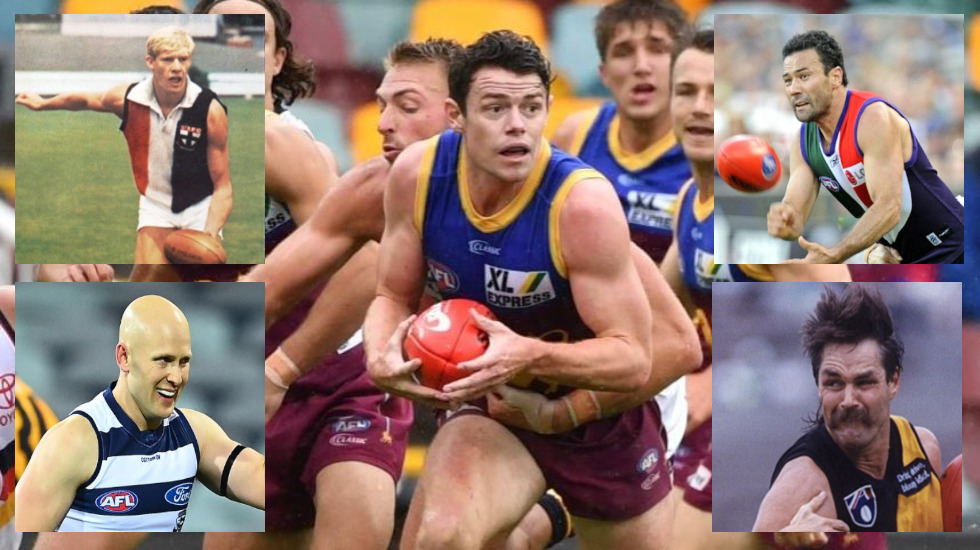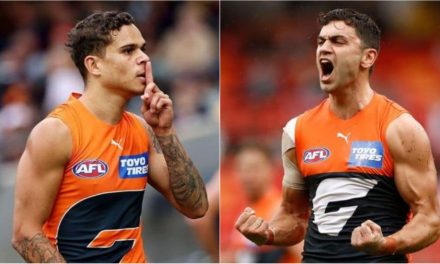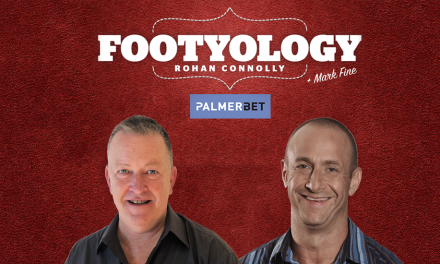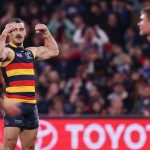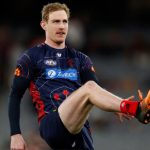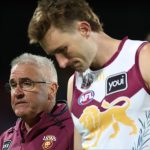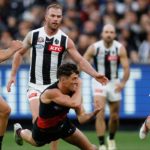Lachie Neale is staying put. Others returned to their roots. (Clockwise): Carl Ditterich, Peter Bell, David Cloke, Gary Ablett
A massive scare was sent through the Brisbane Lions camp earlier this week when it was reported that their star midfielder Lachie Neale was considering a move back to Fremantle.
As Neale has since confirmed, he and his pregnant wife Julie had discussed the possibility of eventually raising their young family back in Western Australia, where Julie is originally from. The strict state border controls which have been in place for much of the pandemic have made it hard for Julie to see her family since early last year.
However, Lions fans breathed a huge sigh of relief on Thursday when the reigning Brownlow medallist reaffirmed his commitment to Brisbane and insisted he would be playing in the maroon, blue and gold next season.
But if Neale did re-join the Dockers, or ends up with them at a later point in his career, he wouldn’t be the first high profile superstar to return to his original club.
Here are 10 of the most famous names in VFL/AFL history to do just that:
Gary Ablett junior (2002-2020. 357 games, 445 goals): Geelong 2002-10, Gold Coast 2011-17, Geelong 2018-20.
In the conversation for greatest player of all time, a walk-up to the Australian Football Hall of Fame when eligible, and Legend status would come as no surprise either at some stage. There were very few things that “The Little Master” couldn’t do out on the footy field. After nine years, two premierships and a Brownlow Medal with his beloved Cats, the AFL, and its dumpster trucks full of cash, came a-knocking with a Godfather offer that was too good to refuse. He became the Suns’ inaugural captain in 2011 and somehow took his game to even greater heights in Queensland, clinching another Brownlow in 2013. However, after seven fruitless, September-free seasons with Gold Coast, the lure of home, and more success, became undeniable, and he played out his last three years with Geelong. He came close to an elusive third flag last year, but fell short at the final hurdle in the grand final against Richmond. Also finished his career with five AFLPA MVPs, three AFLCA champion player of the year awards, eight All-Australian jumpers and six club best-and-fairests.
Eddie Betts (2005-2021. 350 games, 640 goals): Carlton 2005-13, Adelaide 2014-19, Carlton 2020-21.
Arguably the greatest small forward the game has ever seen, Betts finds himself in the very exclusive “350-600” club alongside Kevin Bartlett, Bernie Quinlan and Matthew Pavlich. The winner of no fewer than four Goals Of The Year, he quickly became a crowd favourite not just among the Carlton faithful, but footy fans in general thanks to his sheer wizardry in front of the sticks and his infectious personality. Incredibly, Carlton failed to match Adelaide’s offer for his services at the end of 2013, so he moved to the Crows. It didn’t take long for the Blues to regret their decision as Betts went through the stratosphere, kicking almost half of his career goals at the Crows, despite playing 86 fewer games for them than Carlton. The three-time All-Australian just missed out on the ultimate success in 2017 when his Crows were defeated by the Tigers in the grand final. The lingering effects of Adelaide’s controversial pre-season camp that followed that loss eventually led to him returning to the club that he never wanted to leave in the first place.

Eddie Betts played his final two seasons at Carlton after spending six seasons with Adelaide, which included a grand final.
Des Tuddenham (1962-77. 251 games, 317 goals): Collingwood 1962-71, Essendon 1972-75, Collingwood 1976-77
One of the greatest players to ever pull on a boot, the Hall of Famer left the Magpies after 10 years of service at the end of 1971 to take up the position of captain-coach at Essendon. After four seasons in the job at Windy Hill, Tuddenham returned to the Magpies as skipper for the final two years of his career. However, it was an underwhelming homecoming as wrist and knee injuries restricted him to just 13 games in his second stint in the black-and-white. Was named ruck rover in Collingwood’s Team of the Century.
Carl Ditterich (1963-80. 285 games, 199 goals): St Kilda 1963-72, Melbourne 1973-75, St Kilda 1976-78, Melbourne 1979-80
One of the most feared men in VFL/AFL history, the big blonde ruckman has the distinction of having two stints with two clubs. Initially he left the Saints under the short-lived 10-year rule and returned to Moorabbin because the six-year deal that Melbourne had agreed to ended up being too expensive for them to honour. Ditterich was handed the captaincy upon his return to St Kilda and played another 50 games for them over three seasons. Headed back to Melbourne as captain-coach before retiring.
PLEASE HELP US CONTINUE TO THRIVE BY BECOMING AN OFFICIAL FOOTYOLOGY PATRON. JUST CLICK THIS LINK.
Paul Salmon (1983-2000, 2002. 324 games, 561 goals): Essendon 1983-95, Hawthorn 1996-2000, Essendon 2002
“The Big Fish” left the Bombers in acrimonious circumstances at the end of 1995 as he was booed off the ground by some supporters following their qualifying final win over West Coast at Waverley Park. It turned out to be his second-last game for the club he helped win two premierships, before moving to Hawthorn. Following a tremendous five years with the Hawks, and earning a spot in their Team of the Century, Salmon retired at the conclusion of season 2000. However, after a year out of the game, Salmon answered an SOS from old mentor Kevin Sheedy to help bolster Essendon’s thin ruck stocks. At 37 years of age, Salmon was instrumental in guiding the Bombers to the finals and a first-up finals victory against West Coast. Earned membership in both the Australian Football and Essendon Halls Of Fame.
David Cloke (1974-91. 333 games, 323 goals): Richmond 1974-82, Collingwood 1983-89, Richmond 1990-91
After a glittering nine years at the Tigers, which included two premierships and the captaincy for the 1982 season, Cloke found himself embroiled in the famous “poaching wars” between Richmond and bitter rival Collingwood. Cloke was a fabulous ruckman for the Magpies, but struggled for regular senior selection late in his career at Victoria Park and returned to the Tigers, where he remarkably missed just one game in two seasons before announcing his retirement at 36 years of age. Inducted into Richmond’s Hall of Fame in 2007.
John Rantall (1963-80. 336 games, 10 goals): South Melbourne 1963-72, North Melbourne 1973-75, South Melbourne 1976-79, Fitzroy 1980
One of the best defenders the game has ever seen, Rantall earned selection in the Team of the Century for South Melbourne/Sydney and also North Melbourne, despite only playing three seasons with the Kangaroos. After featuring in North’s first ever flag in 1975, Rantall returned to the Lake Oval for another four seasons where he hardly missed a beat and provided magnificent service in defence as he had done in his first 10 years with the Swans. Finished his career with the Lions.
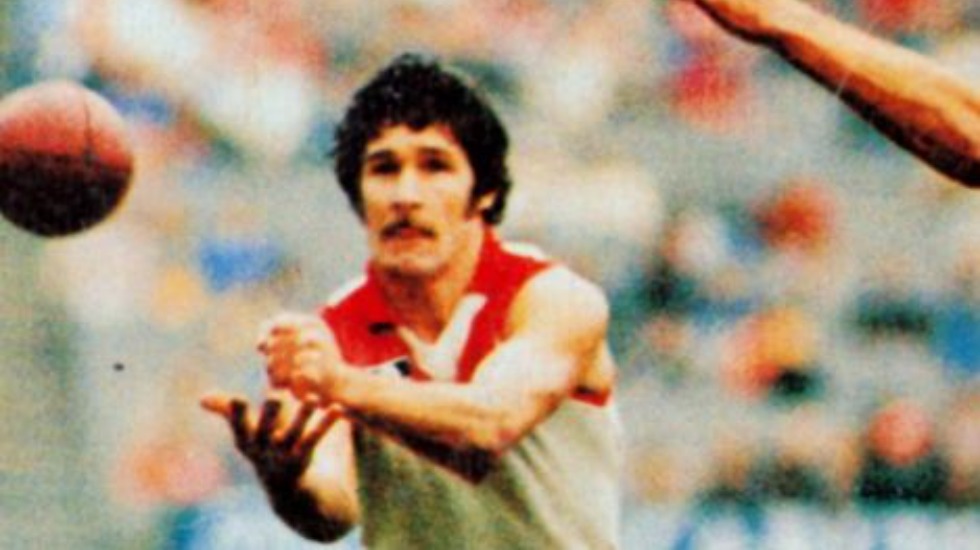
John Rantall ended up back at his original club South Melbourne after being a part of North Melbourne’s first premiership.
Peter Bell (1995-2008. 286 games, 250 goals): Fremantle 1995, North Melbourne 1996-2000, Fremantle 2001-08
The Dockers eventually realised they made a huge mistake when they let the diminutive onballer go at the end of the 1995 season. Bell flourished at the Kangaroos, winning two premierships and turning into one of the most damaging midfielders in the competition. He would become just one of many list management bungles from the early years of the Fremantle Football Club. But at least the Dockers were able to right this wrong, as they lured Bell back for the final eight seasons of his career. He was a star for Fremantle, earning All-Australian honours in 2003, winning three best-and-fairests and captaining the club for five years (2002-2006). Was inducted into the Australian Football Hall of Fame in 2015.
Corey McKernan (1993-2004. 237 games, 310 goals): North Melbourne 1993-2001, Carlton 2002-03, North Melbourne 2004
When Denis Pagan assumed the coaching reins at Carlton ahead of the 2003 season after 10 years in charge of North Melbourne, McKernan must have thought of the famous Al Pacino line from The Godfather III – “Just when I thought I was out, they pull me back in!” McKernan’s departure from North Melbourne in 2001 had a lot to do with the fact that his relationship had become strained with Pagan, so it came as no surprise that he headed back to the Kangaroos after another unwanted year under Pagan. McKernan had a modest return of 17 goals from 14 games in his final year with the Kangas, but at least there was plenty of distance between him and Pagan!
Trent Croad (1998-2009. 222 games, 189 goals): Hawthorn 1998-2001, Fremantle 2002-03, Hawthorn 2004-09.
Just four years after being taken at No.3 in the national draft, Croad was stunningly sent packing to the other side of the country to join the Dockers. The move sparked angry scenes outside Hawthorn’s then-headquarters of Glenferrie Oval, with furious fans demanding answers. The trade deal, which also involved Luke McPharlin heading west, saw the Hawks grab pick No.1 from Freo in the 2001 draft. In the end, it was a landmark list management decision, because the Hawks would select future triple-premiership captain and four-time flag-winning Hawk Luke Hodge. And two short years after joining the Dockers, Croad would head back to Hawthorn and link up with Hodge to eventually play a part in the Hawks’ famous upset 2008 grand final victory against Geelong. Tragically, Croad suffered a serious foot injury in that match and would never play again. His career ended at just 29 years of age.
Other notable mentions: Warwick Capper (Syd/Bris/Syd), Dayne Beams (Coll/Bris/Coll), Bill Picken (Coll/Syd/Coll), Phil Baker (NM/Geel/NM), Peter “Crackers” Keenan (Melb/NM/Ess/Melb), John Barnes (Ess/Geel/Ess), Neville Fields (Ess/SM/Ess), Chris Tarrant (Coll/Fre/Coll), Chris Heffernan (Ess/Melb/Ess), Heath Black (Fre/StK/Fre), Josh Carr (PA/Fre/PA), Brett Montgomery (WB/PA/WB), Jayson Daniels (StK/Syd/StK), Adam McPhee (Fre/Ess/Fre), Aaron Lord (Geel/Haw/Geel)
*Justin Murphy (Rich/Carl/Geel/Carl/Ess) was left out as he didn’t go back to the club he started with, rather the second club he played with.

